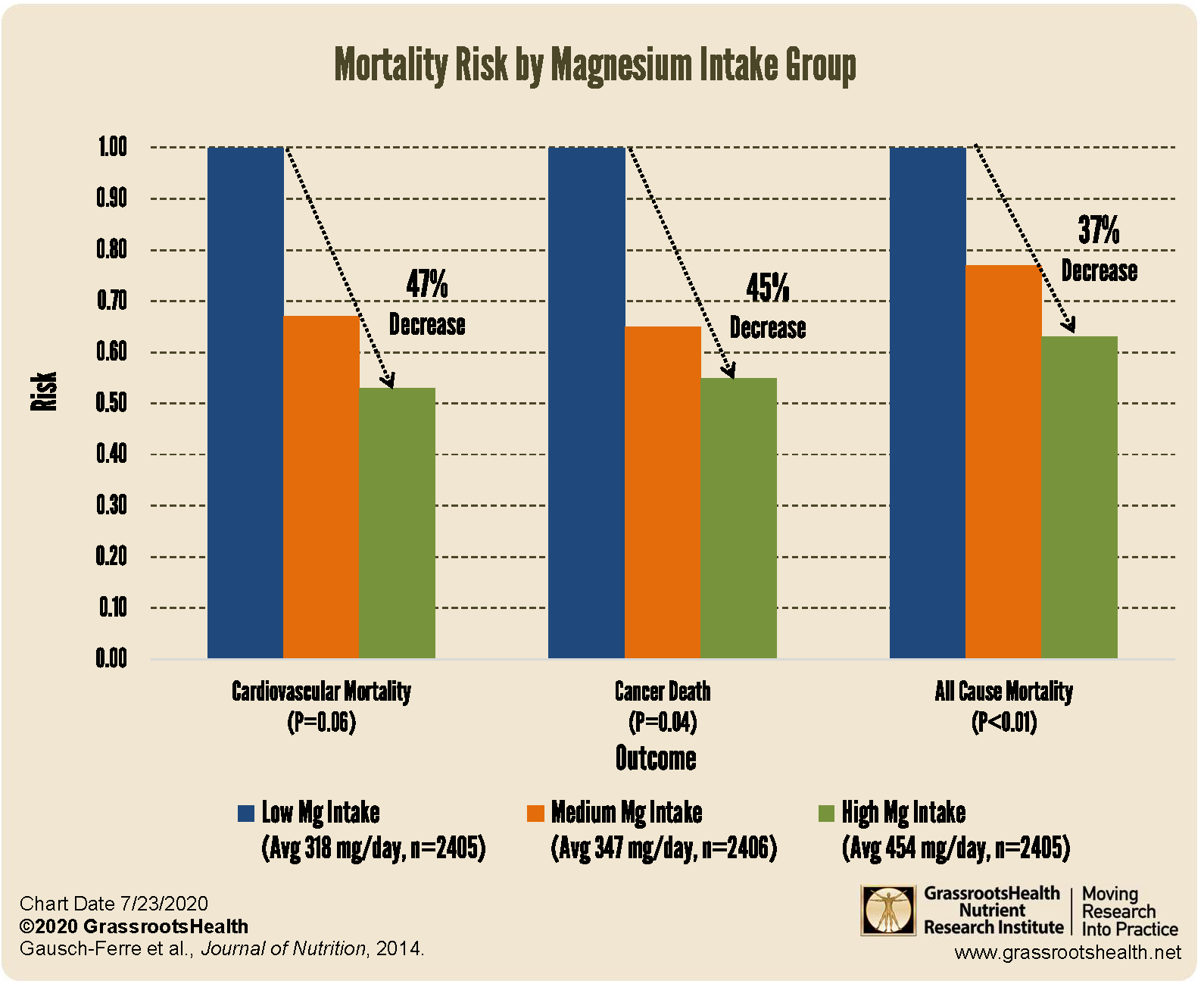Published on July 24, 2020
Research has shown, and continues to show, the relationships between intakes and status of certain nutrients, such as omega-3s and vitamin D, to health outcomes and disease mortality. We have previously discussed the decreased risk seen among those with a higher Omega-3 Index and death from heart disease or incidence of breast cancer, and additional significant reductions in heart attacks, cardiovascular events, and all-cause mortality published in the VITAL study among those supplementing with omega-3s.
Many studies have also been published on vitamin D and its relationship to a decreased risk for cancer and cardiovascular diseases.
Magnesium and Heart Health
 Magnesium has been shown to have a strong relationship to cardiovascular health. One previously reviewed study showed how magnesium uses the same pathway as statins to lower LDL cholesterol and raise HDL cholesterol to reduce inflammation, clotting, and plaque formation in the arteries. Another study illustrated how magnesium helps regulate the heartbeat by controlling the sodium potassium pump and extending the relaxation period after contraction, which may help lower the risk of atrial fibrillation, or irregular heartbeat. Adequate intake of magnesium from the diet or supplemental sources is necessary for maintaining cardiovascular health and reducing the risk of cardiac events.
Magnesium has been shown to have a strong relationship to cardiovascular health. One previously reviewed study showed how magnesium uses the same pathway as statins to lower LDL cholesterol and raise HDL cholesterol to reduce inflammation, clotting, and plaque formation in the arteries. Another study illustrated how magnesium helps regulate the heartbeat by controlling the sodium potassium pump and extending the relaxation period after contraction, which may help lower the risk of atrial fibrillation, or irregular heartbeat. Adequate intake of magnesium from the diet or supplemental sources is necessary for maintaining cardiovascular health and reducing the risk of cardiac events.
Can Magnesium Intake Affect Mortality?
Because of the strong association between magnesium and cardiovascular health, Guasch-Ferre et al. conducted a study to determine whether that association also translated to death from cardiovascular disease (CVD), cancer, and all-causes. They analyzed data from 7216 adults at high risk of CVD to further define the relationship between dietary magnesium intake, CVD (including stroke, heart attack, and cardiovascular death), and mortality from cardiovascular events, cancer, and all-causes. Dietary magnesium intake was calculated and broken down into thirds. The Low Magnesium Intake group had an average magnesium intake of 318 mg/day, the Medium Magnesium Intake group had an average of 347 mg/day, and the High Magnesium Intake group had an average of 454 mg/day.
What Did the Study Find?
Participants were followed an average of 4.8 years; during this time, 323 total deaths, 81 cardiovascular deaths, 130 cancer deaths, and 277 cardiovascular events were recorded for the group.
As shown in the chart above, when analyzed by magnesium intake group, compared to the participants with the lowest magnesium intake, the participants with the highest magnesium intake had a:
- 47% decreased risk of CVD death (P=0.06)
- 45% decreased risk of death from cancer (P=0.04)
- 37% decreased risk of all-cause mortality (P<0.01)
These calculations included adjustments for BMI, smoking status, educational level, physical activity, alcohol intake, and certain disease prevalence.
Nutrients to Protect Your Heart & Health
Do you know what your levels of vitamin D, omega-3s and magnesium are? How can you tell if you are getting enough of each? Our Magnesium*PLUS home blood spot test kit measures all three of these heart-protecting nutrients. Test today!
Are You Getting Enough Vitamin D?
Do you know what your vitamin D level is? Be sure to test today to find out, and take steps to keep it within a target of 40-60 ng/ml or 100-150 nmol/L! Give your immune system the nutrients it needs to support a healthy you and protect yourself from unnecessary diseases.
Through GrassrootsHealth Nutrient Research Institute, you can also test your essential elements magnesium, copper, zinc and selenium, toxins such as lead, mercury and cadmium, as well as your omega-3 levels, inflammation levels and thyroid stimulating hormone (TSH) level. Find out your levels today! Log on to the test selection page (click the link below) to get your tests and see for yourself if your levels can be improved.
Make sure you track your results before and after, about every 6 months!
How can I track my nutrient intake and levels over time?
To help you track your supplement use and nutrient levels, GrassrootsHealth has created the Personal Health Nutrient Decision System called
For each specific supplement, you can track what days you take it, how much, and many other details. This will help you know your true supplemental intake and what patterns of use work for you to reach and maintain optimum nutrient levels. Check it out today!








